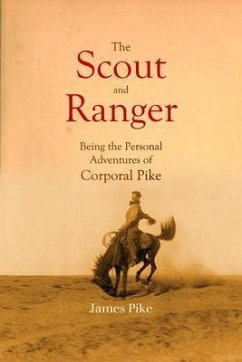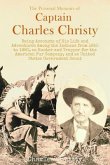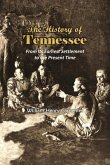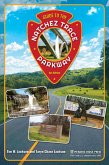"James Pike...arrived in Texas and joined the Texas Rangers, taking part in a series of campaigns against the Comanche Indians." -Eyewitness to the Old West (2004)
"James Pike's The Scout and Ranger...portrays a surprise attack by a band of Indians on a ranger camp and a scene of Indians torturing a captive." -Engraved Prints of Texas, 1554-1900 (2005)
"Pike states that after the fight the Tonkawas indulged in their well-known flair for cannibalism by roasting and eating some of the slain Comanches." -Carbine and Lance: The Story of Old Fort Sill (2013)
Which type of 19th Century warfare would be more risky: fighting the Comanche in Texas as a Texas Ranger or fighting in the Civil War as a scout?
In 1865, James Pike (1834-1867) answers this question in his book titled "The Scout and Ranger."
Pike arrived in Texas in 1859 and joined John Henry Brown's company of Texas Rangers and for the next two years he took part in a series of campaigns against the Comanches, including John M. Smith's incursion into the Indian Territory and to the headwaters of the Red River in 1860.
When Texas seceded from the Union, Pike left the Texas Rangers and joined the Fourth Ohio Cavalry and served as a scout, spy, and courier in Gen. William T. Sherman's army. Sherman praised Pike's "skill, courage and zeal" but warned the scout to "cool down." Pike was captured in 1864 and imprisoned in Charleston, before escaping and returning to Ohio, where he would write his famous book "The Scout and Ranger."
After the end of the Civil War, Pike was commissioned a second lieutenant in the First United States Cavalry and died October 14, 1867, during an Indian attack.
"James Pike's The Scout and Ranger...portrays a surprise attack by a band of Indians on a ranger camp and a scene of Indians torturing a captive." -Engraved Prints of Texas, 1554-1900 (2005)
"Pike states that after the fight the Tonkawas indulged in their well-known flair for cannibalism by roasting and eating some of the slain Comanches." -Carbine and Lance: The Story of Old Fort Sill (2013)
Which type of 19th Century warfare would be more risky: fighting the Comanche in Texas as a Texas Ranger or fighting in the Civil War as a scout?
In 1865, James Pike (1834-1867) answers this question in his book titled "The Scout and Ranger."
Pike arrived in Texas in 1859 and joined John Henry Brown's company of Texas Rangers and for the next two years he took part in a series of campaigns against the Comanches, including John M. Smith's incursion into the Indian Territory and to the headwaters of the Red River in 1860.
When Texas seceded from the Union, Pike left the Texas Rangers and joined the Fourth Ohio Cavalry and served as a scout, spy, and courier in Gen. William T. Sherman's army. Sherman praised Pike's "skill, courage and zeal" but warned the scout to "cool down." Pike was captured in 1864 and imprisoned in Charleston, before escaping and returning to Ohio, where he would write his famous book "The Scout and Ranger."
After the end of the Civil War, Pike was commissioned a second lieutenant in the First United States Cavalry and died October 14, 1867, during an Indian attack.
Dieser Download kann aus rechtlichen Gründen nur mit Rechnungsadresse in A, D ausgeliefert werden.









